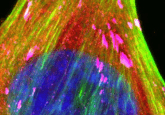New study highlights racial differences in cancer-causing genetic mutations
A recent study from a group based at the Basser Center for BRCA in the Abramson Cancer Center at the University of Pennsylvania (PA, USA) has revealed differences in the patterns of cancer-causing mutations in African–American women when compared with Caucasian women.
The authors of the research, which was presented at the 2016 San Antonio Breast Cancer Symposium (6–10 December, TX, USA), state this may aid in implementing testing recommendations for at-risk African–American patients.
The majority of studies investigating the prevalence of breast and ovarian cancer-causing genes have been conducted in Caucasian women, which in turn, leaves questions regarding the role these genes play in inherited cancers in African–American women.
“We know African–American women are more likely be diagnosed with breast cancer before age 45, and are more likely to die from breast cancer at every age than Caucasian women, but we need more information about the pattern of genetic mutations to provide more precise and targeted care,” stated lead author Payal D Shah (Perelman School of Medicine at the University of Pennsylvania).
“The patterns suggest biological differences, and potentially different genetic factors. Identifying mutations that disproportionately affect African–American women, if there are any, could potentially help guide the genetic testing we do for these at-risk patients.”
To investigate patterns of 19 genes known to cause breast and/or ovarian cancer, the team analyzed DNA samples from 736 women in three groups: African–Americans with cancer, African–Americans without cancer, and Caucasians without cancer.
When the results were compared to previous studies, the researchers noted that BRCA1 and BRCA2 mutations presented at similar levels in both races. CHEK2 mutations, on the other hand, were less prevalent in younger African–American women and cancer-causing mutations of TP53 were more so.
The results also demonstrated differences in terms of the frequency at which African–American women inherited genetic mutations known as ‘variants of uncertain significance’ – mutations for which the implications on cancer risk is not known. In the populations studied, almost 15% of African–American cancer-free women received these results, compared with approximately 11% of Caucasian cancer-free women.
Shah and colleagues estimate that this discrepancy may be due to the high proportions of Caucasians whose genetic information is included in reference databases. The team are hopeful that more widespread testing including African–Americans and increased data sharing among researchers and commercial laboratories will improve the ability to classify mutations as cancer causing or not.
“This study is a first step towards being able to zero in on the mutations that are more prevalent in African-American patients, but future research is needed to better understand the patterns of genetic mutations across patient populations,” Shah concluded. “Our study clearly demonstrates that patients with cancer have more mutations than those without cancer, but studies examining African-American and Caucasian patients with cancer might let us better compare the mutations that are disproportionately present in African–Americans.”
Source: www.pennmedicine.org/news/news-releases/2016/december/study-begins-to-shed-light-on-racial-disparities-of-cancer-causing-genetic-mutations





